
The zebrafish is a freshwater fish belonging to the minnow family (Cyprinidae) of the order Cypriniformes. Native to India and South Asia, it is a popular aquarium fish, frequently sold under the trade name zebra danio. It is also found in private ponds.

The GloFish is a patented and trademarked brand of fluorescently colored genetically modified fish. They have been created from several different species of fish: zebrafish were the first GloFish available in pet stores, and recently tetra, tiger barbs, Rainbow Shark, Siamese fighting fish, and most recently Bronze corydoras have been added to the lineup. They are sold in many colors, trademarked as "Starfire Red", "Moonrise Pink", "Sunburst Orange", "Electric Green", "Cosmic Blue", and "Galactic Purple", although not all species are available in all colors. Although not originally developed for the ornamental fish trade, it is one of the first genetically modified animals to become publicly available. The rights to GloFish are owned by Spectrum Brands, Inc., which purchased GloFish from Yorktown Technologies, the original developer of GloFish, in May 2017.

The giant danio is a tropical fish belonging to the minnow family Cyprinidae. Originating in Sri Lanka, Nepal, and the west coast of India, this species grows to a maximum length of 4-6 inches (10-15 cm), making it one of the largest of the danionins. It is characterized by a blue and yellow, torpedo-shaped body with gray and clear fins.

The pearl danio is a tropical fish belonging to the minnow family Cyprinidae. Originating in Sumatra, Myanmar, and Thailand and Vietnam ,this fish is sometimes found in aquariums by fish-keeping hobbyists. It grows to a maximum length of 2.6 inches (6.5 cm) and lives for around five years. The fish could have a brownish-yellow, pink, or a silver body and two light yellow/white or blue/red stripes. It has an iridescent look. The female fish has two pairs of barbels.
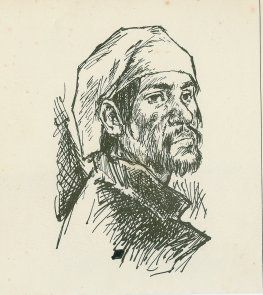
D.Miguel Enríquez, was a privateer from San Juan, Puerto Rico who operated during the early 18th century. A mulato born out of wedlock, Enríquez was a shoemaker by occupation. After working for the governor as a salesman he was recruited to defend Puerto Rico, then a colony of the Spanish Empire, and commanded a small fleet that intercepted foreign merchant ships and other vessels dedicated to contraband. These outlaws were thriving in the waters of the Caribbean Sea and the Atlantic Ocean, notably in the areas surrounding Saint Thomas, Curaçao and Jamaica. Operating during the height of the Golden Age of Piracy, his fleet was also credited with controlling the proliferation of buccaneers in the region. However, he was considered a pirate himself by the enemies of Spain, since it was common practice of the government to ignore when foreign ships were attacked. After some time operating independently, Enríquez received a letter of marque and reprisal from the Spanish Crown, this was a special permit granting him the privileges of a privateer. Corsairs from Puerto Rico were often called guardacostas, or "coast guards." They operated in the same fashion as any other pirate, the only difference was that they did it in the name of Spain, protecting imperial trade restrictions. Employing a systematic approach, Enríquez was able to become the most successful and influential Puerto Rican of his time. However, despite this, he was never able to gain the acceptance of the higher social classes, something that he strived to earn throughout his life.
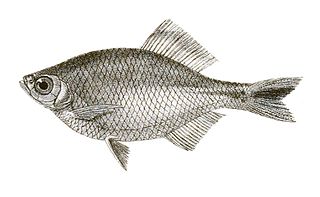
The Bengal danio or Sind danio is a subtropical fish belonging to the minnow family (Cyprinidae). Originating in Pakistan, India, Nepal, Bangladesh, and Afghanistan, this fish is sometimes kept in community tanks by fish-keeping hobbyists. It grows to a maximum length of 4 in (10 cm).
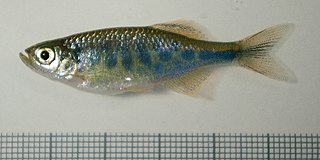
Devario is a genus of fish in the family Cyprinidae native to the rivers and streams of South and Southeast Asia. These fishes have short barbels and many species having vertical or horizontal stripes. These species consume various small, aquatic insects, crustaceans and worms, as well as, in the case of fry, plankton.
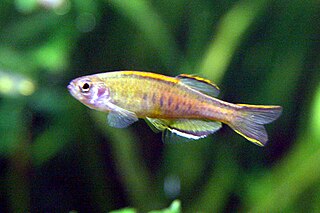
The glowlight danio is a small, schooling fish closely related to the popular zebrafish Danio rerio. This should not be confused with the GloFish, a trademarked brand of fluorescent zebrafish that appear to glow in the dark under ultraviolet light. Danio choprae is an active danionin species that spends most of its time on mid-water levels. This species feeds on insects that have fallen into the water, aquatic insect larvae, and other small animals. In the aquarium, it accepts most foods offered, including most dry foods. It has a streamlined body marked with a brilliant orange longitudinal band and a series of vertical blue-black bars on the flanks. The fins are edged with yellow. In recent years, it has become quite widely traded as an aquarium fish, but otherwise has no commercial importance. Its common name derives from its similarity to the glowlight tetra, a South American characin only distantly related to this fish. They get on well with all other Danio species except the giant danio.

Danio dangila, the moustached danio, is a freshwater fish, and is the largest of the true Danio species at up to (6 in) long. Its name is from its particularly long barbels. It is sometimes kept in aquariums, where its relatively passive nature allows it to be housed in a community tank.

Danio kyathit is also call ocelot danio,is a small, schooling species of fish in the family Cyprinidae. It is endemic to the upper reaches of Irrawaddy River near Myitkyina in northern Myanmar. Described in 1998, it is closely related to the better-known zebrafish or zebra danio, D. rerio.

The term coldwater fish can have different meanings in different contexts.

Danio is a genus of small freshwater fish in the family Cyprinidae found in South and Southeast Asia, commonly kept in aquaria. They are generally characterised by a pattern of horizontal stripes, rows of spots or vertical bars. Some species have two pairs of long barbels. Species of this genus consume various small aquatic insects, crustaceans and worms.
The Burma zebra danio or KP01 danio is a tropical fish belonging to the minnow family (Cyprinidae). It is believed to originate in Myanmar. This fish was discovered in 2006 and is believed to be a separate species from the zebra danio to which it has a close resemblance. However, it is more likely to be closely related to the Yoma danio, and is believed to be a similar size, 6–9 cm, to the latter.

Danio margaritatus, the celestial pearl danio, often referred to in the aquarium trade as galaxy rasbora or Microrasbora sp. 'Galaxy', is a small cyprinid from Myanmar. It has so far been found only in a very small area near Hopong east of Inle Lake, at an elevation of over 1,000 m (3,400 ft). Its habitat is part of the Salween basin, namely the Nam Lang and Nam Pawn Rivers. Discovered in 2006, the species quickly appeared in the aquarium trade, where its small size and bright colours made it an instant hit.
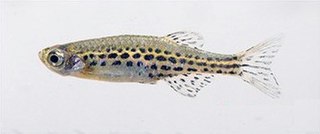
Danio tinwini, commonly called gold-ring danio, is a newly discovered species of Danio from Myanmar. It is also referred to as Danio sp. "TW02". It is a tiny gold fish whose body and fins are covered with blue spots. It has also been referred to as Danio sp "Ringlet" or Danio sp "Blue Ring". It has been described by Kullander and Fang, based on collection by Mr U Tin Win, hence its species name. It is known only from the Mogaung Chaung, Myitkyina District, Kachin State, northern Myanmar. This is a tributary of the Irrawaddy River.

The danionins are a group of small, minnow-type fish belonging to the family Cyprinidae. Members of this group are mostly in the genera Danio, Devario, and Rasbora. They are primarily native to the fresh waters of South and Southeast Asia, with fewer species in Africa. Many species are brightly coloured and are available as aquarium fish worldwide. Danio species tend to have horizontal stripes, rows of spots, or vertical bars, and often have long barbels. Devario species tend to have vertical or horizontal bars, and short, rudimentary barbels, if present at all. All danionins are egg scatterers, and breed in the rainy season in the wild. They are carnivores, living on insects and small crustaceans.
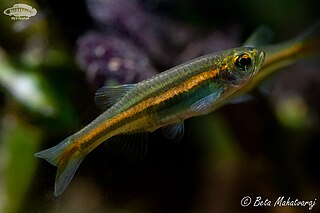
Danio flagrans is a species of Danio endemic to India.














